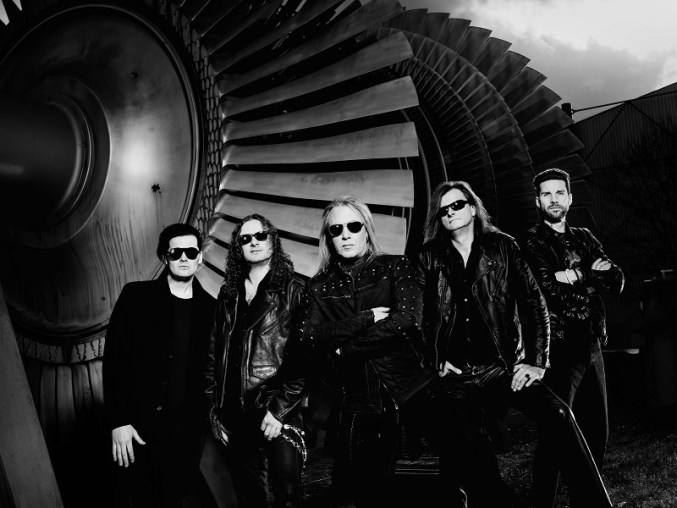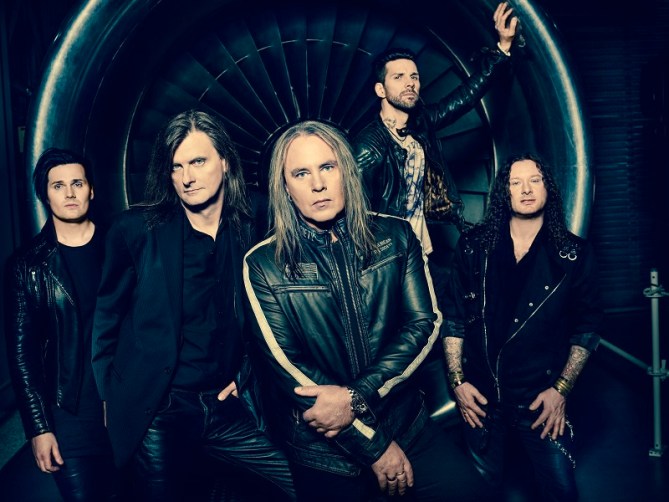Being called genre-defining is just par of the course for Helloween. Since the release of their debut Walls of Jericho back in 1985, they have been consistently shaping speed and power metal, releasing 15 studio albums, and touring consistently. They continue to sell out shows and headline some of the most important festivals in the world. They are, to put it simply, kinda big.
Still, their history has been rather complex, having gone through several line-up changes, and some fluctuations in their success and popularity. Markus Grosskopf, their bassist and one of the only 2 original members left in the band, met with us to discuss their newest release, My God Given Right, and to talk more about this legendary band.
You can read our review of My God Given Right here, or watch our video review here!!
MB: Congratulations on these 30 years of career; few bands can accomplish something like it.
Markus: Thank you very much; it’s still fun!
MB: Take me back to 1985; what was going through your mind 30 years ago, before the release of Walls of Jericho?
Markus: We were young, we just wanted to go out and play. Getting a record contract was, for us, the greatest thing in the world. To then see the record rise, to see that our music was being accepted, was the greatest feeling.
MB: Were you conscious about the fact that you were doing something different? Since some people see the band as the forefathers of “power” or “speed” metal, were you aware of the fact that you were doing something so different?
Markus: When we started there was a lot of “normal” hard rock going on (like Def Leppard, AC/DC) and we thought that if we wanted to succeed we had to do something unique. We wanted to sound different from what was there; we took the speed, we squeezed in the melodies, the harmonies and all that stuff, and it kind of worked! [laughs]
MB: So there was an interest to be different from the beginning…
Markus: Yeah, there were so many bands that sounded the same. They were good, but they didn’t have a unique trademark, and we wanted to achieve that with our music. Once you find that, you never let it go. Hopefully!

MB: How do you see Helloween now, considering everything that has effected the band, namely the changes of singers, the line-up, etc.
Markus: It’s a very different thing from what it was at the beginning, simply because there are 3 new people now, and that over the years many people have been involved in the band. When we hire someone to be in the band we don’t want him to just play an instrument or sing; if they have cool ideas they are always welcome in Helloween‘s music. Roland [Grapow] was writing in a very different style from what Kai [Hansen] was doing with us, and then Sascha [Gerstner] writes very differently from them, etc. The band changes, and as long as we can squeeze that into the Helloween concept, the sound will be different.
Also, you can’t be the same way you were 30 years ago; you grow older, you think a bit differently, you write different music from what you did before, while still trying to reach that Helloween style. Plus, there are only two people left of that line-up, so you just can’t be the same.
MB: Speaking about these changes; are you nervous, or scared, every time you try something new, since you don’t know how the fans will react, considering what happened with Chameleon or Pink Bubbles Go Ape?
Markus: We started very early doing different things, like “I Want Out” or “Dr. Stein” in the Keeper albums. After Walls of Jericho we did a mini LP with just Kai‘s voice and different kinds of heavy metal on it, and then we started getting some new influences into our music, and which most people seem to have liked.
You don’t have to be scared to change, as long as it’s not destroying the old thing that you started… and which we probably did with the Chameleon album. [laughs] When you’re too scared, you won’t get the best ideas. You’ll just repeat what you did and won’t make any changes. With the Chameleon songs, for example, we had a great variety in Helloween‘s music which, if you ask me, was cool. It’s cool to have that variety in your back catalog.
MB: Still, songs from Chameleon or Pink Bubbles Go Ape have been eliminated altogether from the setlist. Even if it was an interesting thing to do at the time, looking back it, do you think those albums were a mistake? Do you regret them?
Markus: The records capture the time and the mood that the band was in when they where done, and so I don’t see them as mistakes. We weren’t able to do anything different, because we wanted to do something like that, and we weren’t interested in doing anything else. I think it had to be done like this, to come to a point where we had to change ourselves again in some way. I think Chameleon is a cool album, but it sounds a bit weird with Helloween written on it. I agree when people say that it’s a weird album under the name of the band, but I don’t regret it.
MB: Well, a lot of Metallica fans felt really weird when they saw LuLu with Lou Reed. Because it’s completely not what you expect. Then again, Chameleon is much better than LuLu, because LuLu is just terrible.
Markus: [laughs] I haven’t even heard it yet!
MB: You shouldn’t!
Markus: I really wouldn’t know

MB: My God Given Right leaked about a week before the official release. By now, how do you feel when you see that this happens to a band?
Markus: The worst thing that happened was with another record, I can’t remember which one, when we had a big listening session in the studio, 2 or 3 weeks before the release, and the very next day it was already online.
You gotta live with it; it’s a cruel thing, you put all your energy on it and then people download it for free, but I’m not the one to judge. Maybe they some people don’t even have enough money or whatever; it happens. It’s one of the things about the internet; you can use it for very good things, like getting information or working with people who are far away, but it’s so uncontrollable that you can do bad things like these, but what can you do? You gotta live with it.
MB: Michael Weikath mentioned in regards to My God Given Right that it was a bit more “open to the public”, maybe a bit more straightforward. Do you see this a big difference between the songwriting style of My God Given Right and that of, for example, Straight Out of Hell or 7 Sinners?
Markus: I don’t know; in the new album I feel the sound a bit warmer, and so it gets on your ear a little quicker. I don’t know what it is, maybe the attitude, or the way it sounds.
MB: The thing is that although I like Helloween, I don’t see the band as a super complex bad to get into; you’ve always been really straightforward with your music, and so I thought it was weird to hear that this album was “friendlier”, because I always thought Helloween’s music was friendly!
Markus: Yeah, but maybe for him it feels like this. Sometimes you just get a certain feeling about music that you can’t really explain.
MB: I read that the band wrote over 30 songs for this album, and that in the end your producer, Charles Bauerfeind, was the one who had to decide what stayed and didn’t. What was this process like for you? Having someone else making these decisions?
Markus: We have all these songs; we know that everything we do will end up in some Helloween item anyway, since we have many different formats for this record. We have a Japanese release, which needs a bonus track, two digital packs, which also need bonus tracks because they’re more expensive, earbooks, which also need bonus tracks, etc. And so in the end you have a lot of songs that you can put in all of the material that is coming out. We like to give people value for their money.
Of course, Charles is also looking at the whole picture, how to make it work within one CD and all that. The management also choose their favorite tracks, then the record company, who also have a different picture as to how the CD should be, etc. Putting the songs on the album is a combination of all of this. If the record company wants to have this or that song, and they tell us that it would be a great hit, or that they can make a good promotion with it, why not give it to them? At the end of the day they’re all Helloween songs!
MB: Well, in your case, only one of your songs, “Living on the Edge” ended up in the retail version of the album, but others ended up in special editions.
Markus: We need those extra songs there; people pay a lot of money for them, so we have to give them a certain quality.
MB: Well, in the last few years Nuclear Blast has been releasing their albums in a lot of formats, so that gives you a big space to experiment.
Markus: Yeah, and we have all these songs, and all of them will be used in these editions. Right now I don’t even know where they will be used… I have it written down somewhere! [laughs] They do so many things; vinyls in different colors, and all that. I kind of like it.
MB: You don’t think it’s too much sometimes? Too many versions of the same album?
Markus: Well, you don’t have to buy it. It’s stuff for collectors, or for people who really want to have something different. If you wanna have a collector’s item you’re free to get it.

MB: Considering that every member of Helloween is a very good musician, is that why you need to resort to someone like your producer to select the tracks, because they’re all kind of just as good as each other?
Markus: It’s good to have that kind of people around you, and who tell you what they feel when they hear the music. If they have an idea as to how to work with it and how to promote it, then it’s even better. It’s a luxury problem; having too many songs! [laughs]
MB: Changing shifts a bit, I thought that it was very interesting when, with your side project Bassinvaders, you released Hellbassbeaters in 2008. I was sad to see that the band didn’t release anything else after that; do you think that you’ll do more?
Markus: I still have an idea to do it, but it’s very time-intensive. It took more than a year to make Hellbassbeaters, with all the guest players and all that. It was challenging for me, and I learned a lot, since I did it all myself. It was very hard work, and you can’t do it just after a Helloween record, when you start touring. You need to have a lot of time off to do something like this.
MB: It’s good to know that at least the plan exists.
Markus: It isn’t a final plan; I’ve thought about doing something different, but I’ll see. The next years are going to be busy with Helloween.
MB: Another luxury problem!
Markus: Yes, you have to decide what you’ll do first; but Helloween is always first. There are plans in my mind to do things; I have songs, ideas, etc. We’ll see.
MB: There is definitely interest among musicians to hear this sort of bass-driven music. You have a lot of virtuoso guitar players doing albums, but you hardly ever hear someone just focusing on the bass.
Markus: [laughs] Yes, that was the idea: writing normal rocks and metal songs, getting a bunch of cool people together, and then trying to do it. It’s not even written for the bass guitar; it’s a more song-oriented kind of bass. That’s how I wanted to do it.
MB: One of the problems that I notice a lot when I review music is that often in the mix they end up drowning the bass. Do you feel this happens a lot?
Markus: Sometimes it’s a pain in the ass; but sometimes, if you wanna push the guitar to make the song “metal”, then you just have to do it. It’s not easy to get everything on the same level, and sometimes you just have to push the guitars and have a cool mix. I wouldn’t touch and produce a Helloween song, because it would be hell! Every part of the band wants to be heard, and it’s not easy to mix everything together.
At the end of the day you go out, play live, and there you hear the thunder of the bass. [laughs]
MB: A few years ago I interviewed Dani, and we talked about the Keeper album. He told me I had to ask you about the identity of this character so… WHO is The Keeper?
Markus: [laughs] We are still around because we have never met him, and we have to stay around until we do. It will take us probably another one or two decades. [laughs]

